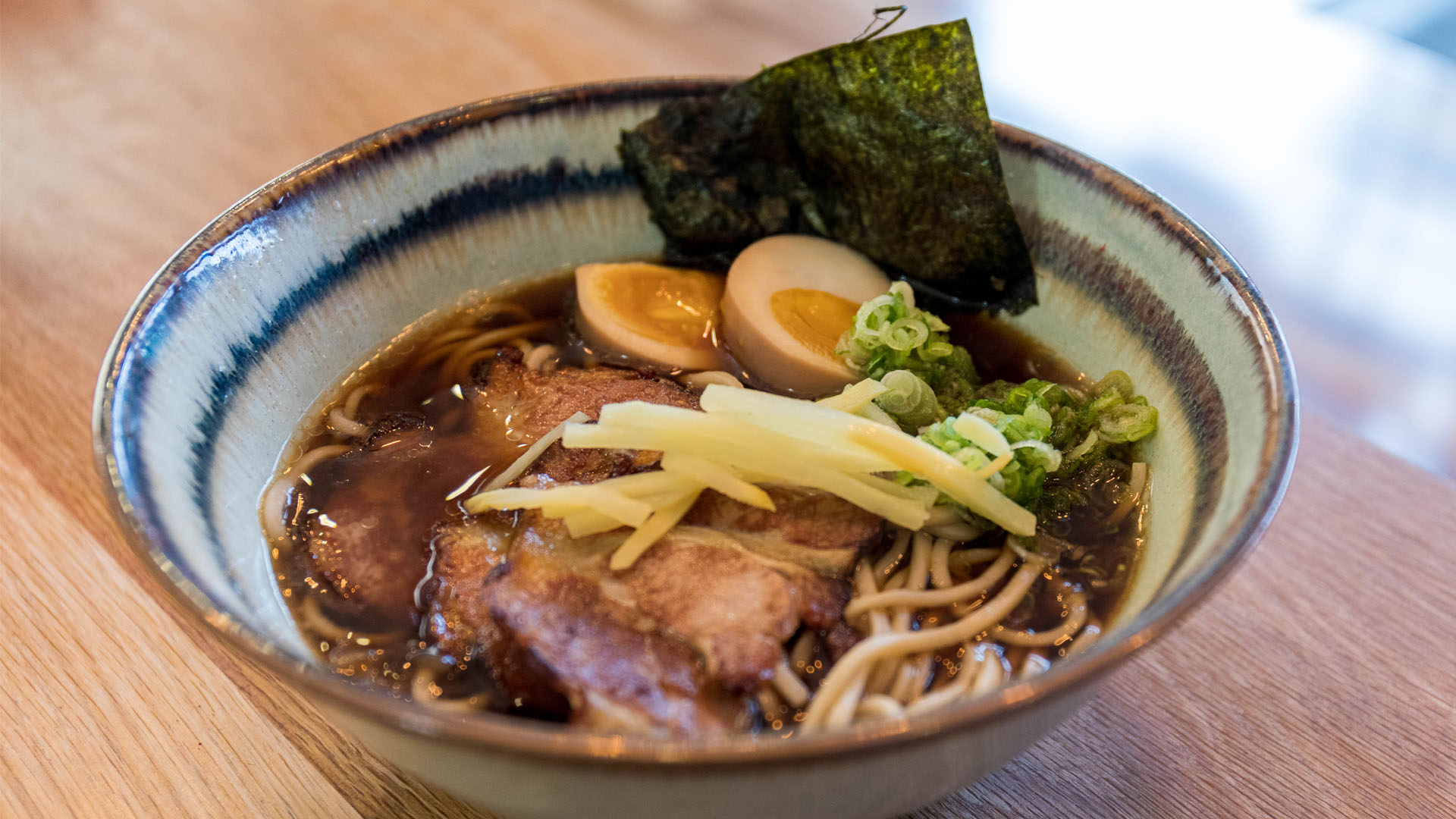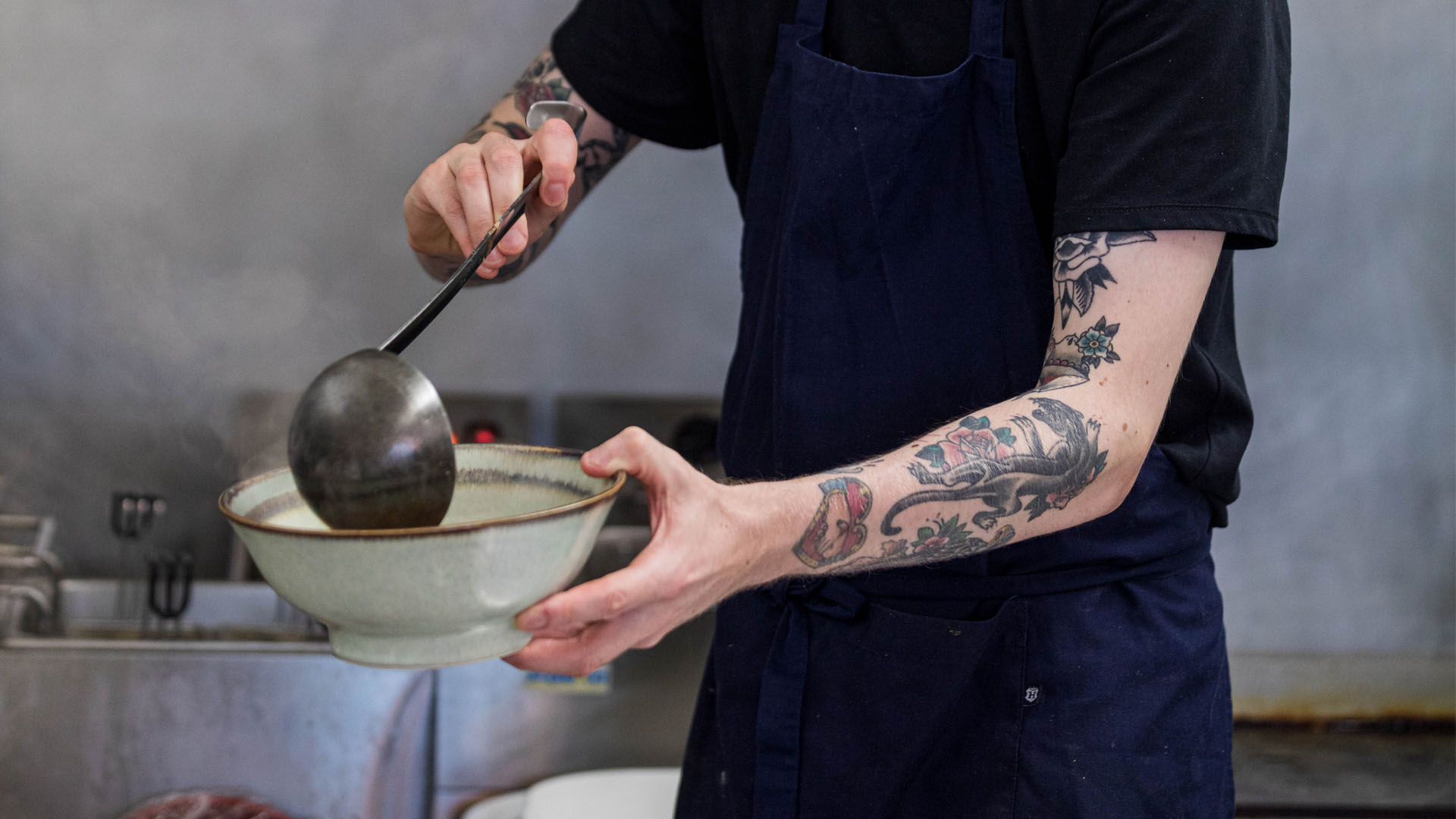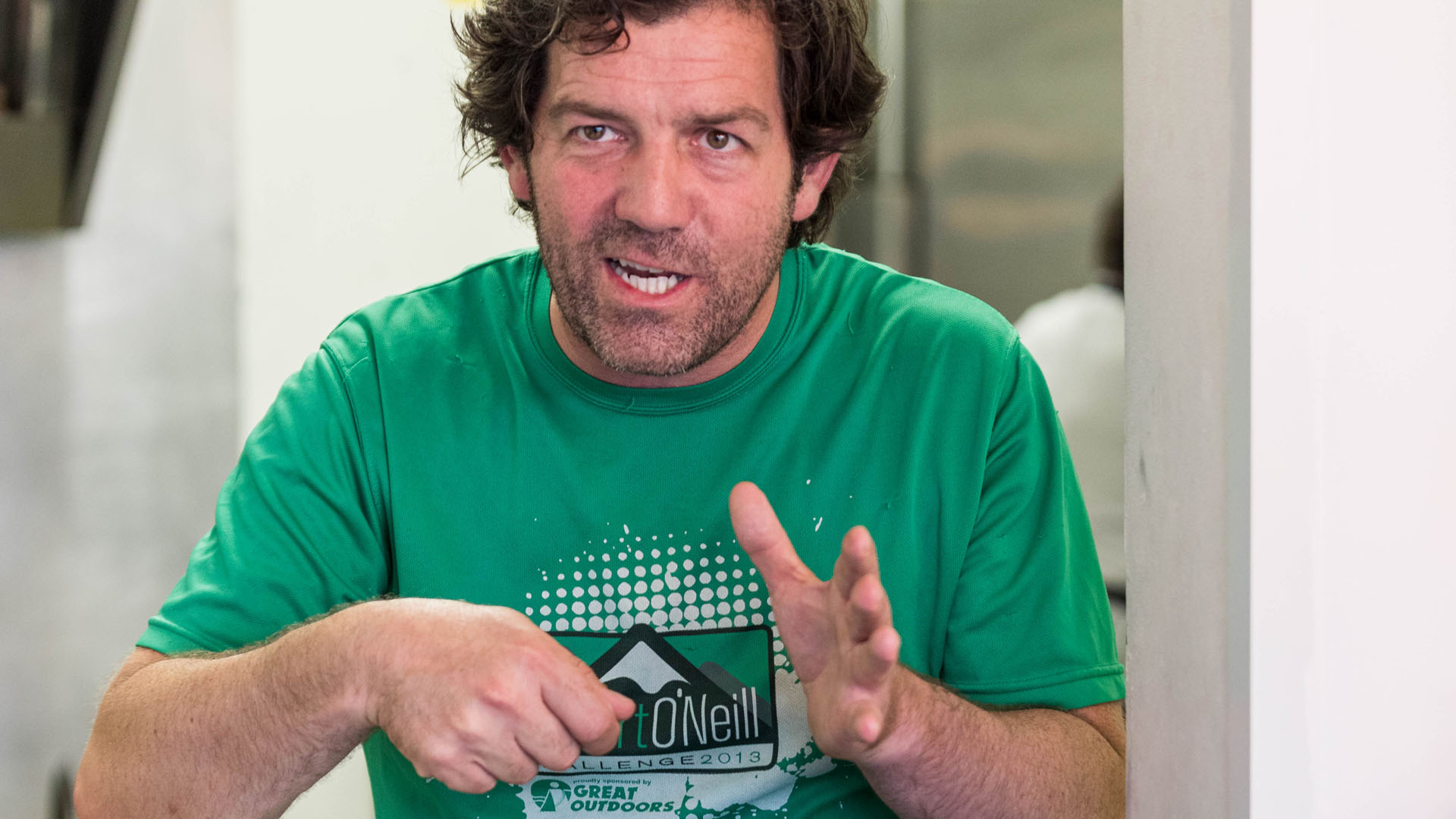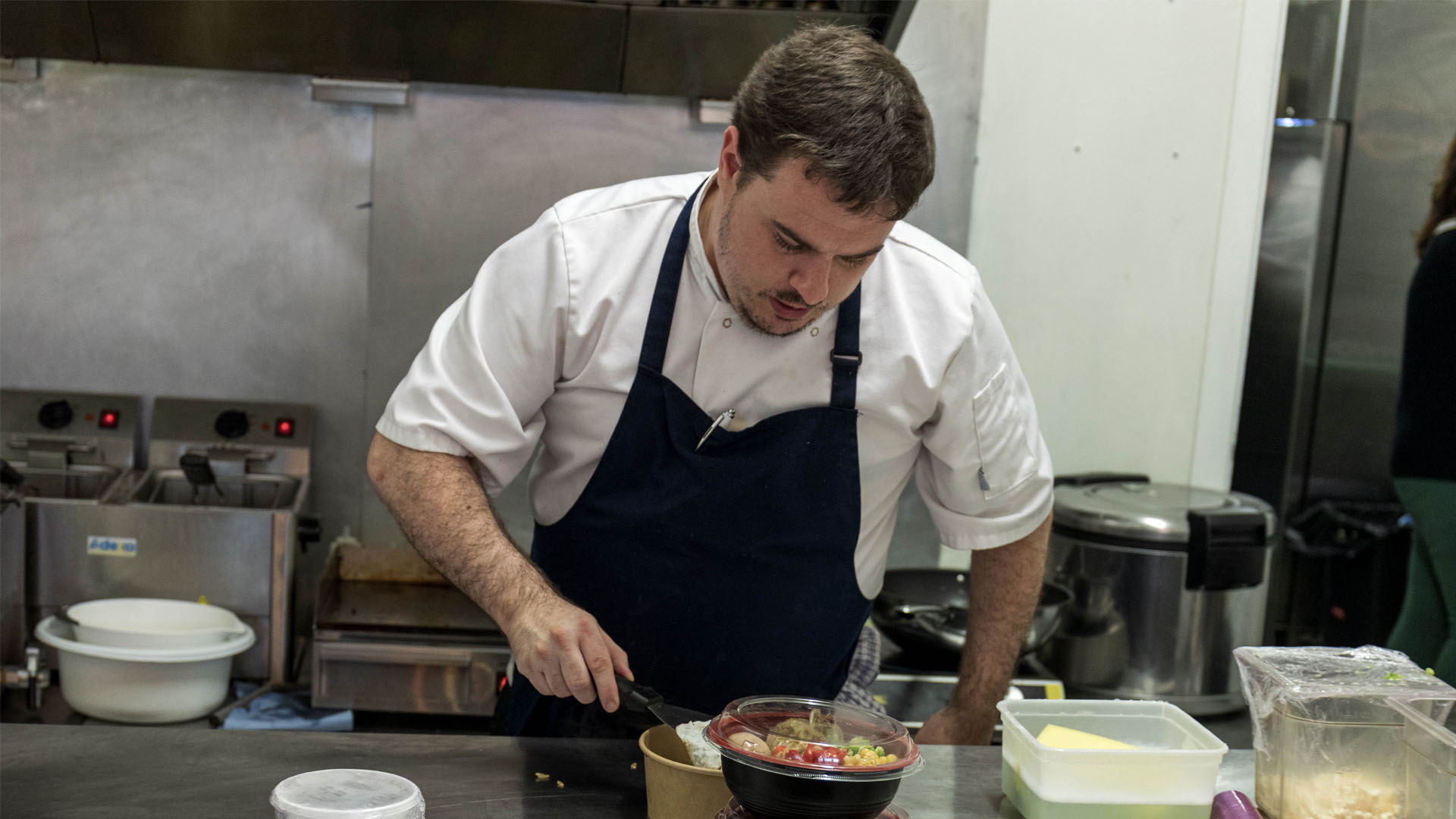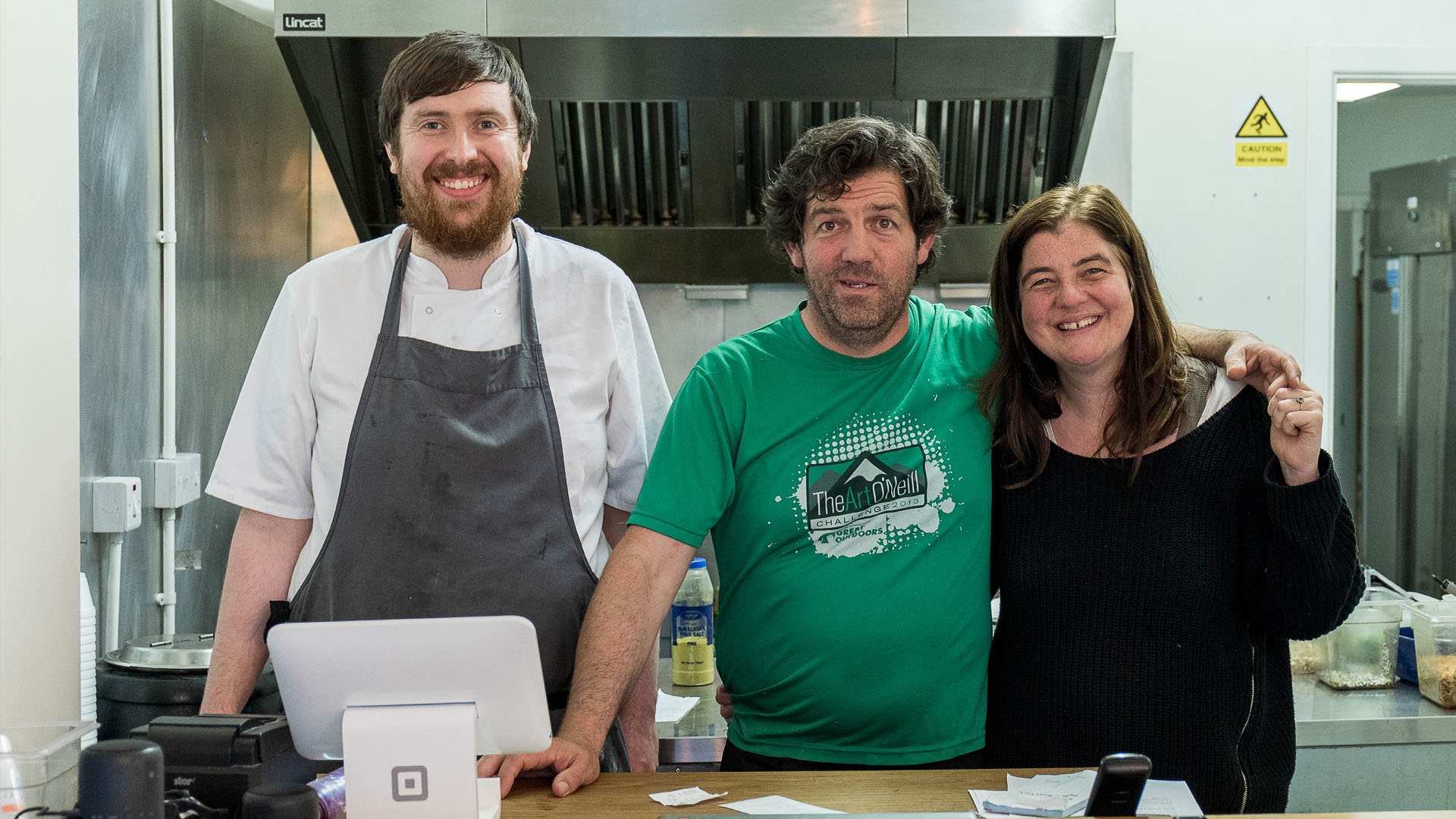Our first series explores how local chefs, restauranteurs, artisans, brewers and distillers are crafting some of the best food and drink you may or may not have heard of, furthering Northern Ireland’s culinary scene and adapting to serve local communities over the pandemic period.
Anytime I’m eating spicy noodles in a bowl, I’m happy.
Anthony Bourdain
We were treated to the best bowl of ramen this side of the Orient. Chef Brian Donnelly, his partner, Jenny Holland, and the lovely sous chefs and line cooks of Bia Rebel provided us keen insight into what joins the two great islands of Japan and Ireland together.
The passion, philosophy and expertise behind what they do speaks for itself, so we won’t get in their way…
How did you get into cooking ramen?
[Jenny] To my knowledge, Brian is the only Irish ramen chef. He’s not Japanese and he’s never been – he’s from Tyrone. Everything we do is made from scratch. We make our own noodles in the traditional way.
[Brian] Don’t let the lack of travel fool you – I’ve done every bit of the research necessary to make sure our ramen is as traditional and of the highest quality possible.
Despite our early struggles starting a small business, I knew I didn’t want to go back to traditional restaurants. We finally decided on doing one thing extremely well – ramen – and focusing on how we can connect Japan and Ireland together. We decided on ‘Bia Rebel’, as ‘bia’ is the word for food in Irish.
I looked up everything there was to know about ramen online. I started with the broth and, before we had the idea to become a full ramen business, we started buying our noodles from the Asian Supermarket. I wanted to find better noodles but couldn’t, so I started making my own noodles, which has really made all the difference. YouTube can teach you anything.
Why ramen?
We asked ourselves, “What makes for quality food that unites humans together?”
The answer is soup! Soup is the ultimate food. It’s embedded in every culture. In France, where restaurants were invented, their kitchen stocks were called ‘restoratives’, which is where the word ‘restaurant’ comes from. They were soup houses, quite literally.
The Japanese say they invented ramen noodles, but ramen actually means ‘Chinese noodle’ – it was called ‘lamen’. So it actually comes from China and we all know that pasta in Italy is directly related to China. In every culture there is flour or ‘starch-based thing’ that’s boiled in a liquid. That’s the easiest way to feed yourself. You make a broth with it because it’s the most economical way to make meat stretch across time to feed your family. So once you strip away all the bullshit and just look at the ‘nuts and bolts’, ramen is the most relatable dish.
What has been the feedback from Japanese people?
Once we started making the ramen, we were selling out on the regular. All of a sudden, Japanese people started finding us. They loved it! They gave us a few steers and suggestions to improve our dishes – mostly aesthetic changes. They taught us how to eat it in an easier, more comfortable way. We listened intently and started to implement these things and a good thing got even better. They told us we are as good as anything you can get in Japan.
Will you go to Japan in the future?
Maybe someday. But it would be to explore everything Japan has to offer, not solely for ramen.
The ramen competitions and festivals in Japan are only open to the Japanese – they don’t allow any foreigners – which I oddly kind of respect. That being said, there’s plenty of ramen chefs outside their borders making revolutionary ramen. To get into these things, you have to keep in contact with them; keep staying reverent to both tradition and innovation.
On Japanese cuisine…
In France, for example, it’s sauce that defines ‘what the food is’. In Japan, it’s all about technique. Technique is more important than ingredients. If you talk to high level Japanese chefs, they put a lot of emphasis on precision. You can’t handle good produce if you don’t have the proper technique.
Is this challenging the notion of ‘Irish food’?
If someone were to ask you to describe Irish food, it’s brown. No matter what dish it is – think about it – it’s always brown. Or beige or some unattractive, boring colour. Too many menus here have the same things – chowder, wings, burger and a stew. And the difficulty here is that there aren’t a lot of good options in the middle. This is a big gap that needs filled. Most cities you visit are now doing that, but Belfast is a bit behind the times. It’s really that middle level where you get the greatest stuff and where a food culture can finally emerge.
Why not fine dining?
I really don’t miss the fine dining kitchens. If you read the Michelin guide, we aren’t exactly what a one star restaurant looks like on the surface. Since we don’t have the table cloths, we’re not considered. They have Michelin stars for great street food in Asia, but that never happens in Europe, even if our food is on that level.
Not that we’re trying to make a point, but you don’t need all that bullshit to have great food.
Is there a philosophy behind your work?
In your head, you have a memory of your mother’s soup. I don’t know your mother, but honestly, it’s probably a terrible soup. But it’s not the quality of the soup that makes it fantastic. It’s the fact that your mother made it – that’s your childhood memory.
What we try to do is re-create that experience. I come from ‘high concept restaurants’; we look at diners differently. It is about creating an experience. We really think about the person eating – what are they thinking, what are they looking at, what are they saying or feeling? What I’m trying to do is make a soup that invokes the memory of your mother or grandmother. Even if you’ve never had our stuff, when you taste it, you’re like, “Holy shit, I’ve had this before!”
And you see it when people are eating. They stop talking to each other – they put their phones down. They eat their stuff quickly and then they resume their life. They get this wee moment of respite. It’s the same you might say about your grandmother’s soup. That’s what we’re trying to do – for 10 quid, of course!
You have to be a bit crazy to do something like this, right?
[Jenny] Japanese people definitely think we’re crazy. To start, if you’re going to do anything in food, there has to be something wrong with you, de facto. If you want an easy, calm, stable life, you don’t go into food – it’s a nightmare. And that doesn’t just apply only to restaurants, I’m talking about the whole supply chain. Everyone wants great food, but they don’t want to pay for it. People outside the industry don’t realise this – everyone is getting squeezed.
Is the local food scene changing?
It is changing, but it’s still behind. And now with COVID, who knows what that’s going to do the food scene here. Compared to places with famous food cultures, like France or Italy, where food is their pride and joy, there’s sometimes awkwardness around food here. Maybe it’s historical. The island has a tough history, so you can understand where it’s coming from.
[Brian] Ireland is in a very unique position – we don’t have a food culture. But that’s a good thing. It’s a blank canvas – we can make it what we want it to be.
Ok, will it change?
Listen, we can’t force a food culture down people’s throats. We tried to cater to that culture. You know, we tried the bio-dynamic stuff, we had vegan shit on the menu. We went the organic route. Nobody was coming. I stayed in one day and look at Jenny and said, “You know what, fuck all them. From now on we’re going to say one thing – ‘We make fresh noodles.’” Once we said that one, simple thing, everything changed.
Don’t try and teach them; give them an opportunity to ask questions. If someone asks you a question and you have the answer, that’s the key to ‘opening the door’. If you try and shove anything down anyone’s throat here, it is 100% rejection – as it should be.
Who else is raving about your ramen?
We get a load of chefs in here on Monday which is normally their day off. They come in incognito. They all try to pretend they’re not chefs. But it’s easy to spot them because their eyes are really, really white. They’re awkward – even the process of sitting down is fucking awkward for them.
[Jenny] Well, in 2019 we got a rave review from Catherine Cleary in the Irish Times, a month after a great review from Jay Rayner, so that was a good year! And we won the Observer Food Monthly Best Cheap Eats in the UK in 2018, after only being open for a few months — that was a reader-voted award, too, so that was immense. We have the greatest customers, they always step up for us.
What’s the best way to eat ramen?
[Jenny] Expect to get your chin wet!!!
[Sous chefs and line cooks] We’ve found that the best way to consume ramen is just to ‘beat it into ya!’ It’s a whole different type of eating experience – you’re very involved in it. You want to pick it up and just slurp it. The way you eat it is the exact opposite of what your mum taught you about etiquette, which is delightful.
Tell us about the Belfast Ramen?
[Jenny] The Belfast Ramen, our signature dish, has 36 ingredients. The tare is made up of soy sauce, two types of tea and mirin – it goes in the bowl first. Then you add the noodles, chicken broth, chashu pork, eggs and a few other key ingredients and it combines to create ‘world peace in a bowl’.
How have you adapted to Covid?
As far as the ramen shop goes, we only just reopened as restrictions lessened, so we’ll see how it goes. To supplement this difficult period, we’ve started a pizzeria – Bia Rebel Pizza – due to the pandemic. Since we can’t technically have customers in here to dine comfortably, that kills a good amount of our business. So, while restrictions are still in place, we’re adding a different dimension to appeal to more people – you have to get creative.
What would you like to see more of in NI’s food and drink scene?
Whilst NI has some of the best produce in the world – the best milk, best meat, best seafood – all of it is filtered out. There’s great places at the top and there’s some great, cheap and cheerful places at the bottom. But those places in the middle never seem to quite get there. That ‘middle gap’ needs to be filled with good quality, local, no-nonsense food. You shouldn’t have to pay £200 for a delicious meal and a great experience, you should be able to get great food at an ‘everyday’ price.
On being the ‘James Bond’ of ramen…
[Brian] You can be a critically acclaimed author. Everybody who’s anybody has read Samuel Beckett – he’s the shit when it comes to writing.
But, take the James Bond series, for example – it’s hugely popular. They make movies out of it, which make plenty of money. Everybody loves it.
Is Ian Fleming a better writer than Beckett? No!!!
But, in the real world, who would you rather be?
What’s your message for the community at this time?
Bia Rebel – eat some ramen!
